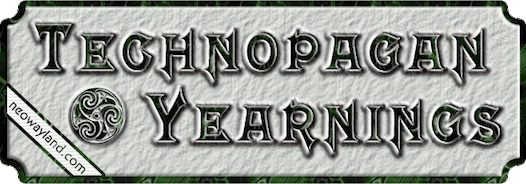Mulling over the nature of Deity
This is a page from the third version of Technopagan Yearnings. There are some formatting differences. Originally published at www.neowayland.com/C692963707/E20061001160411
Fiction and nonfiction collide and spawn in my semi-fevered brain
Every once in a while, my obsessive side comes out. I get focused on one thing to the exclusion of everything else. Usually the cure is to hang out with friends who don't share the same passions, or read fiction. The second way is harder, more time intensive. And it usually takes good fiction mixed in with the not so hot. It helps if I haven't read it all before.
Blows the rust off the thinking pipes. And occasionally blows a gasket or two.
I was cleaning up my contacts and I ran across a link to this article attempting to bring together views and beliefs on Deity. I hadn't read it in a while, but it sparked some thinking. I can see why I saved the link in the first place. I know personally I lean more towards the red side of the triangle, but I have experimented enough with chaos magicks to know that the yellow side can generate some surprisingly effective results.
So with this running through my head, I was reading Sidhe-Devil, a Doc Sidhe novel. Doc Sidhe is a fantasy version of Doc Savage, a classic pulp series. This is only the second Doc Sidhe novel I have read, and both of those have been in the last week. Basically a way to let my neurons fire on about something else than the usual. But then I ran across this.
❝"Well, it's a rather esoteric consideration," Doc said. "We don't know what the gods are, but we know some things about them. Such as the fact that gods that share similar traits seem to have odd ties to one another. Such as Astarte of the Middle East and Aphrodite of Panhellas. Both goddesses devoted to fertility and love.
"When you have a god with a name, who is associated with a people or country," he continued, "devisors call that a persona. But you can also pray to a sort of amalgam god, the one who personifies the common traits but doesn't belong to a specific people, doesn't have a name or any stories associated with him. That's called the archetype. When you successfully structure devisements invoking the archetype, you tend to get a more profound effect. You also place yourself in greater danger if you make mistakes, when payment comes due."❞
Now I don't advise basing faith on fantasy fiction, and I certainly wouldn't want to use magick as described in a novel, but something about this rings true. It seems to me that ideas of persona and archetype in this context are other ways of describing the Red and Yellow corners of the triangle from the Proteus Library article.
Worth some thinking.
Posted: Sun - October 1, 2006 at 04:04 PM






